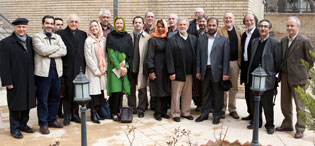
At 4 a.m. on Friday, February 27, according to Tehran local time and only three days after Oscar prizes were given out by Academy of Motion Picture Arts and Sciences, members of the Academy’s Board of Governors flew to Tehran from London onboard a British Airways plane. Famous figures of world cinema had already visited Iran including Juliette Binoche, Sean Penn, Michael Winterbottom, and Viggo Mortensen, who mostly visited the country for issues other than cinema. The nine-member group, however, had been invited by the Iranian House of Cinema; a cinema guild institution which is currently headed by an Iranian filmmaker, Mohammad Mehdi Asgarpour, and to which societies of directors, actors, screenwriters and other professionals are affiliated. The group included Sid Ganis, President of the Academy since 2005; Annette Bening, a three time Oscar candidate for her roles in American Beauty and Being Julia and winner of 23 international awards; William Horberg, an independent producer and a producer of The Talented Mr. Ripley, The Quiet American, Cold Mountain, and The Kite Runner; Frank Pierson, screenwriter for Cat Ballou, Cold Hand Luke, and Dog Day Afternoon; James Longley, director of Gaza Strip and Iraq in Fragments documentaries; Phil Alden Robinson, writer and director of All of Me, In the Mood, and Field of Dreams; Alfre Woodard, actress of Remember My Name, Cross Creek, and Love & Basketball; Ellen Harrington, the Academy’s director of exhibitions and special events and a founder of the Academy’s Media Education Program; and Tom Pollock, producer and chairman of Universal Pictures whose company has made more than 200 films under his lead including various episodes of Jurassic Park, Born on the Fourth of July, and Apollo 13.
In an interview with Los Angeles Times, Sid Ganis said their trip to Iran was part of a program by the Academy which had already taken them to Vietnam. He added that their main goals were to meet with the Iranian filmmakers in order to know about their problems and explain problems of their international counterparts to them. They also planned to screen their films at the House of Cinema and watch Iranian movies. He emphasized that nobody masterminded their trip, but they knew through the House of Cinema that the trip was possible and had immediately agreed to the plan. Ganis said a filmmaker is only a filmmaker with similar needs, problems and artistic intensions who faced the same problems all over the world. He said they followed an artistic form which was universal and used that form to express their viewpoints. Ganis emphasized that they just planned to cooperate with other filmmakers and sought to have open discussions with the Iranian filmmakers.
SUBSCRIBE

